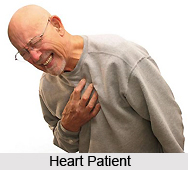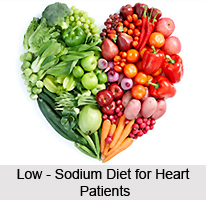 There has been a marked increase in the incidence of heart disease in recent years. The term coronary heart disease covers a group of clinical syndromes arising particularly from failure of the coronary arteries to supply sufficient blood to the heart. They include angina pectoris, coronary thrombosis or heart attack and sudden death without infarction. The disease affects people of all ages and both sexes, although it is more common in men than in women, especially among those aged 40-60 years.
There has been a marked increase in the incidence of heart disease in recent years. The term coronary heart disease covers a group of clinical syndromes arising particularly from failure of the coronary arteries to supply sufficient blood to the heart. They include angina pectoris, coronary thrombosis or heart attack and sudden death without infarction. The disease affects people of all ages and both sexes, although it is more common in men than in women, especially among those aged 40-60 years.
Causes of Heart Diseases
The basic causes of heart disease are wrong dietary habits, faulty style of living and various stresses. There are seven major risk factors in coronary heart diseases, each or a combination of these risk factors can contribute to heart disease. Most of them are of dietary origin. viz:
•Elevated blood levels of cholesterol
•Triglycerides grid other fatty substances
•Elevated blood pressure
•Elevated blood uric acid levels (mainly caused by high protein)
•Certain metabolic disorders, notably diabetes
•Obesity
•Smoking
•Lack of physical exercises
Changing one`s life style and readjusting the diet can control these risk factors. Constant worry and tension stimulates the adrenal glands to produce more adrenaline and cortisones. This also contributes to constricted arteries, high blood pressure and increased work for the heart.
Treatment of Heart Diseases by Nature Cure
The fundamental conditioning factor in all heart diseases is the diet. A corrective diet designed to alter body chemistry and improve the quality of general nutritional intake can, in many cases, reverse the degenerative changes, which have occurred in the heart and blood vessels.
Diet
The diet should be lacto-vegetarian, low in sodium and calories. It should consist of high quality, natural organic foods, with emphasis on whole grains, seeds, fresh fruits and vegetables. Best food sources are unrefined, raw, crude vegetable oils as well. Foods which should be eliminated are all white flour products, sweets, chocolates, canned foods in syrup, soft drinks, squashes, all hard fats of animal origin such as butter, cream and fatty meats including the reduction in the intake of salts and sugar substantially. The patient should also avoid tea, coffee, alcohol and tobacco.
Fruits and Vegetables-Fruits and vegetables in general are highly beneficial in the treatment of heart disease. Seasonal fruits are quite effective heart tonics. Apples especially contain heart-stimulating properties and the patients suffering from the weakness of heart should make liberal use of apples and apple jams. Fresh grapes pineapples, oranges, custard apples, pomegranate and coconut water also tone up the heart. Grapes are effective in heart pain and palpitation of the heart and the disease can be rapidly controlled if the patient adopts an exclusive grapes diet for few days. Grape juice especially will be valuable when one is actually suffering from a heart attack.
Indian Gooseberry or Amla-Indian gooseberry or amla is considered an effective home remedy for heart disease. It tones up the functions of all the organs of the body and builds up health by destroying the heterogeneous elements and renewing lost energy.
Onion- It is another excellent remedy for heart diseases. Onions are useful in normalising the percentage of blood cholesterol by oxidising excess cholesterol. One teaspoon of raw onion juice first thing in the morning will be highly beneficial in such cases.
 Honey- Honey has marvellous properties to prevent all sorts of heart diseases. It tones up the heart and improves the circulation. It is also effective in cardiac pain and palpitation of the heart. One tablespoonful daily after food is sufficient to prevent all sorts of heart troubles.
Honey- Honey has marvellous properties to prevent all sorts of heart diseases. It tones up the heart and improves the circulation. It is also effective in cardiac pain and palpitation of the heart. One tablespoonful daily after food is sufficient to prevent all sorts of heart troubles.
Other Beneficial Foods-The essential fatty acids, which reduce serum cholesterol levels and minimize the risk of arteriosclerosis, can be obtained from sunflower seed oil, corn oil or safflower oil. Several studies have indicated that garlic can reduce the cholesterol level in persons whose body normally cannot regulate the cholesterol fractions. Other important cholesterol lowering are alfalfa and yogurt. Lecithin helps prevent fatty deposits in arteries.
Patients with heart disease should increase their intake of foods rich in vitamin E, as this vitamin promotes the functioning of the heart by improving oxygenation of the cells. It also improves the circulation and muscle strength. Many whole meal products and green vegetables, particularly outer leaves of cabbage are good sources of vitamin E. The vitamin B group is important for heart and circulatory disorders. The best sources of vitamin B are whole grains.
Vitamin C is also essential as it protects against spontaneous breaches in capillary waits, which can lead to heart attacks. It also guards against high blood cholesterol. The stress of anger fear, disappointment and similar emotions can raise blood fat and cholesterol levels immediately but this reaction to stress can do little harm if the diet is adequate in vitamin C and pantothenic acid. The richest sources of vitamin C are citrus fruits.
The following is the suggested diet for persons suffering from hypertension or some disorder of the heart:
On Rising-After waking up, the first thing one can have is warm water with lemon juice and honey or fresh fruit juice of apple, grapes, orange, and pineapple.
Breakfast-Fresh fruits such as apples, grapes, pears, peaches, pineapple, orange, melons, one or two slices whole meal toast, yogurt, skimmed milk or soya milk is a good idea to have in breakfast.
Mid-Morning- Fresh fruit juice or coconut water.
Lunch- Salad of vegetables such as lettuce, cabbage, endive, carrots, cucumber, beetroot, tomato, onion and garlic; one or two slices of whole meal bread or chapattis; curd; fresh grapes and other fruits in season are suitable for lunch.
Mid-Afternoon- One or two wholemeal biscuits and fruit juice is ideal for heart patient.
Dinner- Fresh fruit or vegetable juice or soup, two lightly cooked vegetables and one or two whole-wheat chapattis are good for dinner.
The patient should also pay attention to other laws of nature for health building such as taking moderate exercise, getting proper rest and sleep, adopting the right mental attitude and getting fresh air and drinking pure water.
 Water Treatments for Heart Diseases
Water Treatments for Heart Diseases
The use of an ice bag on the spinal area between the second and tenth thoracic vertebrae for 30 minutes three times a week, a hot compress applied to the left side of the neck for 30 minutes every alternate day and massage of the abdomen and upper back muscles are water treatments which are beneficial in cases of heart disease.
Hot foot and hand baths are excellent for relieving the pain of angina pectoris. To this may be added hot packs on the chest over the heart for one minute and a cold pack applied alternately for five minutes.
Treatment of Heart Diseases by Yogic Asanas
Asanas such as shavasana, vajrasana and gomukhasana, Vogic kriyas like jalaneti and pranayamas such as shitali, sitkari and bhramari are also helpful in providing relief to heart patients.
Treatment of Heart Diseases by Acupressure
Tightness in the chest can make breathing difficult, thus the usage of acupressure points on the chest can make breathing easier for the patients suffering from heart diseases, since it can reduce chest pain and relieve depression. Stimulating these points with pressure, needles, or heat triggers the release of endorphins, which are the neurochemicals that relieve pain. As a result, pain is blocked and the flow of blood and oxygen to the affected area is increased. This causes the muscles to relax and promotes healing in case of the heart diseases.
Acupressure contributes to the improvement of sclerotic blood vessels, relieves fullness in chest for congestive heart patients, and improves general health so that heart patients can maintain self through exercise.
Treatment of Heart Diseases by Magnetic Therapy
The action of heart is slowed down if the south pole of a magnet is held in the right hand and quickened if held in the left hand. By utilizing this fact, conditions like palpitation can be effectively controlled if a magnet is applied regularly to the right hand.
In the similar way, the normal elasticity of the arteries and arterioles can be restored if regular use of a magnet and magnetized water is made. The regular use of magnet helps the blood in dissolving the morbid deposits of the cholesterol and calcium, which cause hardening of the walls of the vessels namely, arteriosclerosis and sclerosis.




